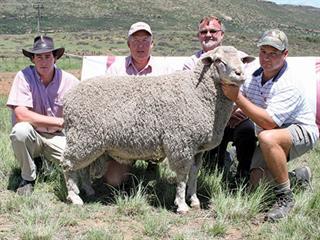The production of pure wool has declined so much in SA and Australia that processors fear long-term shortages. “The increase in wool prices over the last 16 months is (currency considerations apart) the direct result of this shortage, and is set to continue unless the availability of good Merino wool changes,” says John Lapersonne of SBL Wools in Port Elizabeth. “About 30% of the weekly offerings are now ‘other’ than wool, being inclusive of Dohne and Gladdelyf sheep. Crossbreeding in the Western Cape, which was well known for its stylish Merino wools, has increased as a result of too many years of poor wool prices. Now farmers are paying less attention to wool and more to meat production. The severe drought in KZN and the eastern Free State is also affecting the style of wools, which are more dusty, thinner in staple and much less attractive than they are under normal weather conditions,” he says. ecently a softer rand and improving demand for the better-quality wools helped to boost the market, and Cape Wools’ Merino Indicator gained 1,4% at this week’s sale to finish the day at R58,72/kg (clean), according to spokesperson Ona Viljoen. “The rand was steady at today’s sale after being R6,84 against the dollar. During the sale, it was trading at R6,63, down 3% on last week. The currency was also 3% softer against the euro,” she says. he prices of most long Merino fleece wools were 1% to 2% dearer. There was keen demand for superfine wools in particular, and a bale of 15,8 micron sold by Alfonso and François van Niekerk of Robvue Farm, Bedford, fetched the second-highest price so far this season when New England Wool paid R106/kg (greasy) for this one-bale line. A verage price movements for AWEX-type fleeces, MF4 and MF5 of 70mm and 80 mm: 19 micron up 1,6% to R72,28/kg; 20 micron up 1,5% at R64,66/kg; 21 micron up 1,9% at R59,65/kg; and 22 micron up 0,2%, closing at R56,27/kg. – Roelof Bezuidenhout
Pure Merino wool shortage spells continued price hikes
The production of pure wool has declined so much in SA and Australia that processors fear long-term shortages. “The increase in wool prices over the last 16 months is (currency considerations apart) the direct result of this shortage, and is set to continue unless the availability of good Merino wool changes,” says John Lapersonne of SBL Wools in Port Elizabeth.
Issue Date: 30 November 2007









